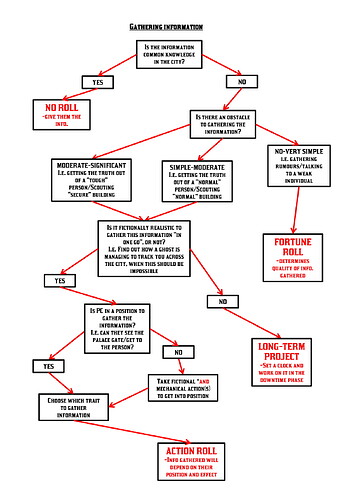Hi everyone,
So I’m new to BitD- just played my first session last Saturday and we all LOVED it. But I’m still working out some stuff which I find unclear. One of those things is gathering information. I’d like to share my ideas with you, including a flow chart of the kind of step-by-step decision making a new GM may go through to manage gathering info in-game.
If anyone wants to add anything, or point out any flaws in my understanding of the game, that’d be a real help. Thanks in advance!
So here’s an example situation that sort of plays out my thinking on how gathering information can work…
The PCs have decided their OBJECTIVE . They want to send a message to the Red Sashes- this is their turf and they won’t be messed with.
They’ve decided their PLAN . They’ve going to Assault the faction’s lieutenant in broad daylight, leaving him for dead.
Now they need to find the missing DETAIL . Maybe they decide to hit him when he’s at his favourite gambling den, where he goes every afternoon after lunch- that is common knowledge after all.
They could then (and some suggest should ) jump straight into the ENGAGEMENT ROLL and the action.
But perhaps the PCs decide they want some more info. Maybe they want to know what his drink of choice is, or if he has a weakness for a particular card game. Ok, so they want to GATHER INFORMATION .
Let’s take the example of finding out if the NPC has a fondness for a particular drink. There are various fictional and mechanical possibilities:
Possibilities
This is common knowledge. They ask the GM. He or she tells them. Go to ENGAGEMENT .
This isn’t common knowledge, but shouldn’t be too hard to find out. They fictionally go to chat to the barkeep the day before the score, buy him a drink or two and casually mention they want to get their mate, the Mark , a bottle for his birthday. FORTUNE roll to determine how good the info is. Then on to ENGAGEMENT and the score.
The GM instead decides that the barkeep, being a good acquaintance of the Mark, wouldn’t just hand this info out. The PCs have to fictionally get in a position to question/pressure/socialize.
They choose an action (command, consort, study, survey… it’s up to the PCs )
Of course every action is inherently risky, and as such has consequences . As you can see, the PCs are looking to get information to help them on the score, but they’re also risking consequences which may really hinder that very score, or come into play in a different way. So, is it really worth them trying to gather information now? Wouldn’t it be better to wait for after the ENGAGEMENT roll, and use a flashback, incur STRESS …?
You can also go the other way. Perhaps the GM decides that actually sitting in the gambling den, just another group of clients, and subtly observing the barkeep, wouldn’t attract undue notice. It wouldn’t carry any particular risk It’s not really an OBSTACLE . Ok, so the GM would then go back to a fortune roll. This is fine. BUT, may lead to excessive preparation for a score. It may even lessen chances of consequences later on. Reduce the number of desperate situations that the PCs find themselves in. Reduce the amount of stress they need to burn.
What’s wrong with all that? I hear you ask? Well, if your group is happy and enjoying the game, I would say absolutely nothing. But certainly, following John Harper’s suggestions and thinking behind the game, the very idea of Blades in the Dark is to put you in increasingly difficult and stressful situations. It’s only when PCs find themselves with their backs to the wall that they truly start to live the game.
So does that sound like I’ve got it right? This has been bugging me for some time while preparing for my first session, and I want to get it right in my head before the second one, if possible. I’ve also uploaded an image of that flow diagram I’ve drawn up as an attempt to externalise what should become (with time) second nature for GMs when the PCs are gathering info.
Thanks again to anyone who can comment/shed light…
